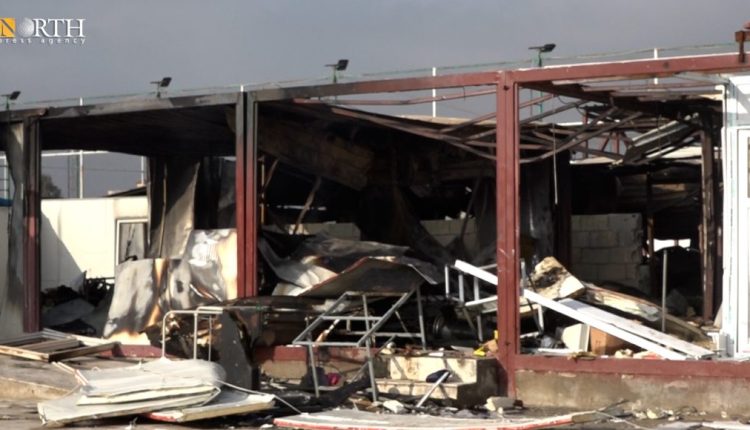
By Fattah Issa
KOBANI, Syria (North Press) – The residents of Kobani, northern Syria, used to benefit from the Meshtanour Medical Center. Now the center is closed and out of service after it was targeted by Turkish drone strikes days ago.
Nabo Hame, a 40-year-old resident of Kobani, laments the closure of the city’s only clinic. “Today, patients come to the center but leave without receiving treatment.”
Hame wonders, “Where will we go now? The people of Kobani used to bring their children to the center for vaccinations, and the elderly relied on it to receive free medication. But now it’s closed.”
On Dec. 25, Turkish bombardment targeted several sites in Kobani and its countryside, including the Meshtanour Medical Center and knocked it completely out of service.
Providing aid to needy people
The center’s services were not limited to the city, as residents of nearby villages would go to it to receive treatment and obtain free medication.
According to the Kobani Health Board, linked to the Autonomous Administration of North and East Syria (AANES), the Center consisted of several departments and provided medical services in partnership with the Health Board, Médecins du Monde Organization (MDM, Doctors of the World), and an association in Germany.
The Health Board noted that the Turkish drone strikes have completely knocked the clinic out of commission, in addition to causing damage to ambulances.
Samira Ahmad, 52, a resident of Kobani, strongly emphasizes the importance of the health center for the people in the city and its countryside.
“The center used to help the needy residents of Kobani by providing free medication for diabetes and blood pressure. It was essential because it helped them,” Ahmad said.
She further highlights that the most affected by the disruption of the center will be people with limited income.
She said that the center played a crucial role in providing medical care to the residents, especially considering the high cost of medication. “Medical centers must never be bombed.”
Jihan Osso, 41, another resident of Kobani, called on both the international community and human rights organizations to assume their responsibilities in addressing the well-being of the population and stressed the need for them to break their silence regarding the atrocities inflicted upon civilians by Turkey.
“Turkey has repeatedly attacked us; it attacks civilian facilities such as schools and medical centers. Our children are afraid now,” she said.
Osso recalls previous incidents, saying, “Last year, Turkey bombed a children’s hospital on Meshtanour Hill, and they also targeted a clinic in the village of Qaramogh. In addition, they targeted areas in close proximity to schools.”
Heavy losses
Idris Ahmad, the director of Meshtanour Medical Center, told North Press, “Due to the Turkish bombardment, all the medical appliances in the center were burned. All the medications in the warehouse and pharmacy were destroyed. We cannot determine the exact cost of the losses.”
Ahmad further said that there was an emergency department in the center with six ambulances which were partially damaged.
On Dec. 25, Ahmad Mahmoud, Co-chair of AANES’ Health Board in Kobani, told North Press that the damage caused by Turkish airstrikes on Meshtanour Medical Center are estimated at $200,000.
The center consisted of the Outpatient Department, the Diabetic Foot Department, the Emergency Department, the Woman and Children Department, the Psychological Support Department, and the Vaccines Department which included leishmaniasis vaccines, according to Mahmoud.
Mahmoud noted that the Center provided services to about 500 patients per day in all departments. Over 110,000 patients benefited from the center’s services every year.
The center was initially established by the Health Board with the support of Médecins Sans Frontières (MSF) Organization approximately eight years ago. However, when MSF ceased its operations in the area, MDM stepped in to support the center in collaboration with the Health Board.
The director of the Meshtanour Health Center emphasized that following the center’s shutdown, “it would take months, if not years, to establish a similar center and resume operations, providing services to the local population.”
